- Home
- Jack London
The Little Lady of the Big House Page 3
The Little Lady of the Big House Read online
Page 3
The girl at the piano discovered him, winked, and played on. Not for another minute did the dancers spy him. They gave startled cries, collapsed, laughing, in each other's arms, and the music stopped. They were gorgeous, healthy young creatures, the three of them, and Forrest's eye kindled as he looked at them in quite the same way that it had kindled when he regarded the Fotherington Princess.
Persiflage, of the sort that obtains among young things of the human kind, flew back and forth.
«I've been here five minutes,» Dick Forrest asserted.
The two dancers, to cover their confusion, doubted his veracity and instanced his many well-known and notorious guilts of mendacity. The girl at the piano, Ernestine, his sister-in-law, insisted that pearls of truth fell from his lips, that she had seen him from the moment he began to look, and that as she estimated the passage of time he had been looking much longer than five minutes.
«Well, anyway,» Forrest broke in on their babel, «Bert, the sweet innocent, doesn't think you are up yet.»
«We're not… to him,» one of the dancers, a vivacious young Venus, retorted. «Nor are we to you either. So run along, little boy. Run along.»
«Look here, Lute,» Forrest began sternly. «Just because I am a decrepit old man, and just because you are eighteen, just eighteen, and happen to be my wife's sister, you needn't presume to put the high and mighty over on me. Don't forget—and I state the fact, disagreeable as it may be, for Rita's sake—don't forget that in the past ten years I've paddled you more disgraceful times than you care to dare me to enumerate.
«It is true, I am not so young as I used to was, but—» He felt the biceps of his right arm and made as if to roll up the sleeve. «—But, I'm not all in yet, and for two cents…»
«What?» the young woman challenged belligerently.
«For two cents,» he muttered darkly. «For two cents… Besides, and it grieves me to inform you, your cap is not on straight. Also, it is not a very tasteful creation at best. I could make a far more becoming cap with my toes, asleep, and… yes, seasick as well.»
Lute tossed her blond head defiantly, glanced at her comrades in solicitation of support, and said:
«Oh, I don't know. It seems humanly reasonable that the three of us can woman-handle a mere man of your elderly and insulting avoirdupois. What do you say, girls? Let's rush him. He's not a minute under forty, and he has an aneurism. Yes, and though loath to divulge family secrets, he's got Meniere's Disease.»
Ernestine, a small but robust blonde of eighteen, sprang from the piano and joined her two comrades in a raid on the cushions of the deep window seats. Side by side, a cushion in each hand, and with proper distance between them cannily established for the swinging of the cushions, they advanced upon the foe.
Forrest prepared for battle, then held up his hand for parley.
«'Fraid cat!» they taunted, in several at first, and then in chorus.
He shook his head emphatically.
«Just for that, and for all the rest of your insolences, the three of you are going to get yours. All the wrongs of a lifetime are rising now in my brain in a dazzling brightness. I shall go Berserk in a moment. But first, and I speak as an agriculturist, and I address myself to you, Lute, in all humility, in heaven's name what is Meniere's Disease? Do sheep catch it?»
«Meniere's Disease is,» Lute began,… «is what you've got. Sheep are the only known living creatures that get it.»
Ensued red war and chaos. Forrest made a football rush of the sort that obtained in California before the adoption of Rugby; and the girls broke the line to let him through, turned upon him, flanked him on either side, and pounded him with cushions.
He turned, with widespread arms, extended fingers, each finger a hook, and grappled the three. The battle became a whirlwind, a be-spurred man the center, from which radiated flying draperies of flimsy silk, disconnected slippers, boudoir caps, and hairpins. There were thuds from the cushions, grunts from the man, squeals, yelps and giggles from the girls, and from the totality of the combat inextinguishable laughter and a ripping and tearing of fragile textures.
Dick Forrest found himself sprawled on the floor, the wind half knocked out of him by shrewdly delivered cushions, his head buzzing from the buffeting, and, in one hand, a trailing, torn, and generally disrupted girdle of pale blue silk and pink roses.
In one doorway, cheeks flaming from the struggle, stood Rita, alert as a fawn and ready to flee. In the other doorway, likewise flame– checked, stood Ernestine in the commanding attitude of the Mother of the Gracchi, the wreckage of her kimono wrapped severely about her and held severely about her by her own waist-pressing arm. Lute, cornered behind the piano, attempted to run but was driven back by the menace of Forrest, who, on hands and knees, stamped loudly with the palms of his hands on the hardwood floor, rolled his head savagely, and emitted bull-like roars.
«And they still believe that old prehistoric myth,» Ernestine proclaimed from safety, «that once he, that wretched semblance of a man-thing prone in the dirt, captained Berkeley to victory over Stanford.»
Her breasts heaved from the exertion, and he marked the pulsating of the shimmering cherry-colored silk with delight as he flung his glance around to the other two girls similarly breathing.
The piano was a miniature grand—a dainty thing of rich white and gold to match the morning room. It stood out from the wall, so that there was possibility for Lute to escape around either way of it. Forrest gained his feet and faced her across the broad, flat top of the instrument. As he threatened to vault it, Lute cried out in horror:
«But your spurs, Dick! Your spurs!»
«Give me time to take them off,» he offered.
As he stooped to unbuckle them, Lute darted to escape, but was herded back to the shelter of the piano.
«All right,» he growled. «On your head be it. If the piano's scratched
I'll tell Paula.»
«I've got witnesses,» she panted, indicating with her blue joyous eyes the young things in the doorways.
«Very well, my dear.» Forrest drew back his body and spread his resting palms. «I'm coming over to you.»
Action and speech were simultaneous. His body, posited sidewise from his hands, was vaulted across, the perilous spurs a full foot above the glossy white surface. And simultaneously Lute ducked and went under the piano on hands and knees. Her mischance lay in that she bumped her head, and, before she could recover way, Forrest had circled the piano and cornered her under it.
«Come out!» he commanded. «Come out and take your medicine!»
«A truce,» she pleaded. «A truce, Sir Knight, for dear love's sake and all damsels in distress.»
«I ain't no knight,» Forrest announced in his deepest bass. «I'm an ogre, a filthy, debased and altogether unregenerate ogre. I was born in the tule-swamps. My father was an ogre and my mother was more so. I was lulled to slumber on the squalls of infants dead, foreordained, and predamned. I was nourished solely on the blood of maidens educated in Mills Seminary. My favorite chophouse has ever been a hardwood floor, a loaf of Mills Seminary maiden, and a roof of flat piano. My father, as well as an ogre, was a California horse-thief. I am more reprehensible than my father. I have more teeth. My mother, as well as an ogress, was a Nevada book-canvasser. Let all her shame be told. She even solicited subscriptions for ladies' magazines. I am more terrible than my mother. I have peddled safety razors.»
«Can naught soothe and charm your savage breast?» Lute pleaded in soulful tones while she studied her chances for escape.
«One thing only, miserable female. One thing only, on the earth, over the earth, and under its ruining waters—»
A squawk of recognized plagiarism interrupted him from Ernestine.
«See Ernest Dowson, page seventy-nine, a thin book of thin verse ladled out with porridge to young women detentioned at Mills Seminary,» Forrest went on. «As I had already enunciated before I was so rudely interrupted, the one thing only that can balm and embalm this sav
age breast is the 'Maiden's Prayer.' Listen, with all your ears ere I chew them off in multitude and gross! Listen, silly, unbeautiful, squat, short-legged and ugly female under the piano! Can you recite the 'Maiden's Prayer'?»
Screams of delight from the young things in the doorways prevented the proper answer and Lute, from under the piano, cried out to young Wainwright, who had appeared:
«A rescue, Sir Knight! A rescue!»
«Unhand the maiden!» was Bert's challenge.
«Who art thou?» Forrest demanded.
«King George, sirrah!—I mean, er, Saint George.»
«Then am I thy dragon,» Forrest announced with due humility. «Spare this ancient, honorable, and only neck I have.»
«Off with his head!» the young things encouraged.
«Stay thee, maidens, I pray thee,» Bert begged. «I am only a Small Potato. Yet am I unafraid. I shall beard the dragon. I shall beard him in his gullet, and, while he lingeringly chokes to death over my unpalatableness and general spinefulness, do you, fair damsels, flee to the mountains lest the valleys fall upon you. Yolo, Petaluma, and West Sacramento are about to be overwhelmed by a tidal wave and many big fishes.»
«Off with his head!» the young things chanted. «Slay him in his blood and barbecue him!»
«Thumbs down,» Forrest groaned. «I am undone. Trust to the unstrained quality of mercy possessed by Christian young women in the year 1914 who will vote some day if ever they grow up and do not marry foreigners. Consider my head off, Saint George. I am expired. Further deponent sayeth not.»
And Forrest, with sobs and slubberings, with realistic shudders and kicks and a great jingling of spurs, lay down on the floor and expired.
Lute crawled out from under the piano, and was joined by Rita and
Ernestine in an extemporized dance of the harpies about the slain.
In the midst of it, Forrest sat up, protesting. Also, he was guilty of a significant and privy wink to Lute.
«The hero!» he cried. «Forget him not. Crown him with flowers.»
And Bert was crowned with flowers from the vases, unchanged from the day before. When a bunch of water-logged stems of early tulips, propelled by Lute's vigorous arm, impacted soggily on his neck under the ear, he fled. The riot of pursuit echoed along the hall and died out down the stairway toward the stag room. Forrest gathered himself together, and, grinning, went jingling on through the Big House.
He crossed two patios on brick walks roofed with Spanish tile and swamped with early foliage and blooms, and gained his wing of the house, still breathing from the fun, to find, in the office, his secretary awaiting him.
«Good morning, Mr. Blake,» he greeted. «Sorry I was delayed.» He glanced at his wrist-watch. «Only four minutes, however. I just couldn't get away sooner.»
CHAPTER IV
From nine till ten Forrest gave himself up to his secretary, achieving a correspondence that included learned societies and every sort of breeding and agricultural organization and that would have compelled the average petty business man, unaided, to sit up till midnight to accomplish.
For Dick Forrest was the center of a system which he himself had built and of which he was secretly very proud. Important letters and documents he signed with his ragged fist. All other letters were rubber-stamped by Mr. Blake, who, also, in shorthand, in the course of the hour, put down the indicated answers to many letters and received the formula designations of reply to many other letters. Mr. Blake's private opinion was that he worked longer hours than his employer, although it was equally his private opinion that his employer was a wonder for discovering work for others to perform.
At ten, to the stroke of the clock, as Pittman, Forrest's show– manager, entered the office, Blake, burdened with trays of correspondence, sheafs of documents, and phonograph cylinders, faded away to his own office.
From ten to eleven a stream of managers and foremen flowed in and out. All were well disciplined in terseness and time-saving. As Dick Forrest had taught them, the minutes spent with him were not minutes of cogitation. They must be prepared before they reported or suggested. Bonbright, the assistant secretary, always arrived at ten to replace Blake; and Bonbright, close to shoulder, with flying pencil, took down the rapid-fire interchange of question and answer, statement and proposal and plan. These shorthand notes, transcribed and typed in duplicate, were the nightmare and, on occasion, the Nemesis, of the managers and foremen. For, first, Forrest had a remarkable memory; and, second, he was prone to prove its worth by reference to those same notes of Bonbright.
A manager, at the end of a five or ten minute session, often emerged sweating, limp and frazzled. Yet for a swift hour, at high tension, Forrest met all comers, with a master's grip handling them and all the multifarious details of their various departments. He told Thompson, the machinist, in four flashing minutes, where the fault lay in the dynamo to the Big House refrigerator, laid the fault home to Thompson, dictated a note to Bonbright, with citation by page and chapter to a volume from the library to be drawn by Thompson, told Thompson that Parkman, the dairy manager, was not satisfied with the latest wiring up of milking machines, and that the refrigerating plant at the slaughter house was balking at its accustomed load.
Each man was a specialist, yet Forrest was the proved master of their specialties. As Paulson, the head plowman, complained privily to Dawson, the crop manager: «I've worked here twelve years and never have I seen him put his hands to a plow, and yet, damn him, he somehow seems to know. He's a genius, that's what he is. Why, d'ye know, I've seen him tear by a piece of work, his hands full with that Man-Eater of his a-threatenin' sudden funeral, an', next morning, had 'm mention casually to a half-inch how deep it was plowed an' what plows'd done the plowin'!—Take that plowin' of the Poppy Meadow, up above Little Meadow, on Los Cuatos. I just couldn't see my way to it, an' had to cut out the cross-sub-soiling, an' thought I could slip it over on him. After it was all finished he kind of happened up that way—I was lookin' an' he didn't seem to look—an', well, next A.M. I got mine in the office. No; I didn't slip it over. I ain't tried to slip nothing over since.»
At eleven sharp, Wardman, his sheep manager, departed with an engagement scheduled at eleven: thirty to ride in the machine along with Thayer, the Idaho buyer, to look over the Shropshire rams. At eleven, Bonbright having departed with Wardman to work up his notes, Forrest was left alone in the office. From a wire tray of unfinished business—one of many wire trays superimposed in groups of five—he drew a pamphlet issued by the State of Iowa on hog cholera and proceeded to scan it.
Five feet, ten inches in height, weighing a clean-muscled one hundred and eighty pounds, Dick Forrest was anything but insignificant for a forty years' old man. The eyes were gray, large, over-arched by bone of brow, and lashes and brows were dark. The hair, above an ordinary forehead, was light brown to chestnut. Under the forehead, the cheeks showed high-boned, with underneath the slight hollows that necessarily accompany such formation. The jaws were strong without massiveness, the nose, large-nostriled, was straight enough and prominent enough without being too straight or prominent, the chin square without harshness and uncleft, and the mouth girlish and sweet to a degree that did not hide the firmness to which the lips could set on due provocation. The skin was smooth and well-tanned, although, midway between eyebrows and hair, the tan of forehead faded in advertisement of the rim of the Baden Powell interposed between him and the sun.
Laughter lurked in the mouth corners and eye-corners, and there were cheek lines about the mouth that would seem to have been formed by laughter. Equally strong, however, every line of the face that meant blended things carried a notice of surety. Dick Forrest was sure— sure, when his hand reached out for any object on his desk, that the hand would straightly attain the object without a fumble or a miss of a fraction of an inch; sure, when his brain leaped the high places of the hog cholera text, that it was not missing a point; sure, from his balanced body in the revolving desk-chair to the balanced back-head of
him; sure, in heart and brain, of life and work, of all he possessed, and of himself.
He had reason to be sure. Body, brain, and career were long-proven sure. A rich man's son, he had not played ducks and drakes with his father's money. City born and reared, he had gone back to the land and made such a success as to put his name on the lips of breeders wherever breeders met and talked. He was the owner, without encumbrance, of two hundred and fifty thousand acres of land—land that varied in value from a thousand dollars an acre to a hundred dollars, that varied from a hundred dollars to ten cents an acre, and that, in stretches, was not worth a penny an acre. The improvements on that quarter of a million acres, from drain-tiled meadows to dredge– drained tule swamps, from good roads to developed water-rights, from farm buildings to the Big House itself, constituted a sum gaspingly ungraspable to the country-side.
Everything was large-scale but modern to the last tick of the clock. His managers lived, rent-free, with salaries commensurate to ability, in five—and ten-thousand-dollar houses—but they were the cream of specialists skimmed from the continent from the Atlantic to the Pacific. When he ordered gasoline-tractors for the cultivation of the flat lands, he ordered a round score. When he dammed water in his mountains he dammed it by the hundreds of millions of gallons. When he ditched his tule-swamps, instead of contracting the excavation, he bought the huge dredgers outright, and, when there was slack work on his own marshes, he contracted for the draining of the marshes of neighboring big farmers, land companies, and corporations for a hundred miles up and down the Sacramento River.
He had brain sufficient to know the need of buying brains and to pay a tidy bit over the current market price for the most capable brains. And he had brain sufficient to direct the brains he bought to a profitable conclusion.

 The Son of the Wolf
The Son of the Wolf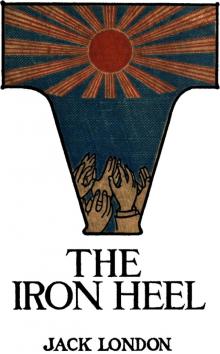 The Iron Heel
The Iron Heel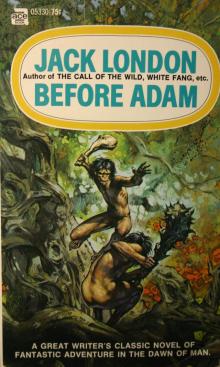 Before Adam
Before Adam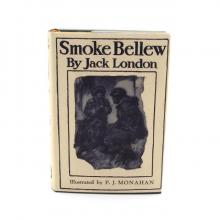 Smoke Bellew
Smoke Bellew The Call of the Wild
The Call of the Wild The Valley of the Moon Jack London
The Valley of the Moon Jack London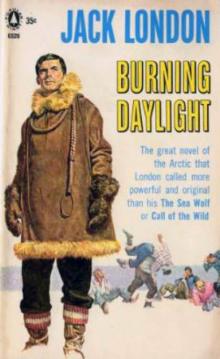 Burning Daylight
Burning Daylight The Sea Wolf
The Sea Wolf White Fang
White Fang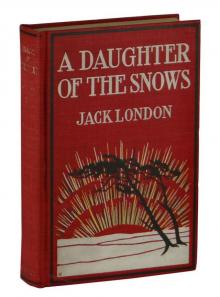 A Daughter of the Snows
A Daughter of the Snows The Night-Born
The Night-Born A Son Of The Sun
A Son Of The Sun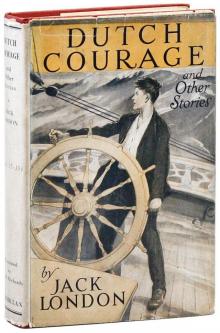 Dutch Courage and Other Stories
Dutch Courage and Other Stories The People of the Abyss
The People of the Abyss Michael, Brother of Jerry
Michael, Brother of Jerry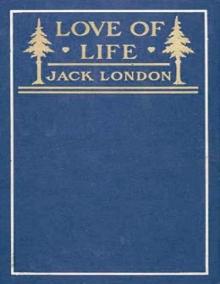 Love of Life, and Other Stories
Love of Life, and Other Stories Lost Face
Lost Face The Road
The Road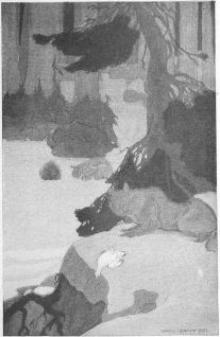 Love of Life
Love of Life The Turtles of Tasman
The Turtles of Tasman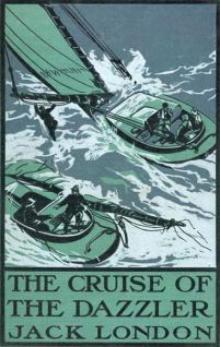 The Cruise of The Dazzler
The Cruise of The Dazzler The Heathen
The Heathen The Scab
The Scab The Faith of Men
The Faith of Men Adventure
Adventure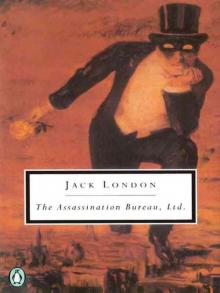 The Assassination Bureau, Ltd.
The Assassination Bureau, Ltd. The Call of the Wild, White Fang, and Other Stories
The Call of the Wild, White Fang, and Other Stories The Call of the Wild and Selected Stories
The Call of the Wild and Selected Stories Jerry of the Islands
Jerry of the Islands Hearts of Three
Hearts of Three The House of Pride
The House of Pride Moon-Face and Other Stories
Moon-Face and Other Stories Children of the Frost
Children of the Frost South Sea Tales
South Sea Tales The Strength of the Strong
The Strength of the Strong The Jacket (The Star-Rover)
The Jacket (The Star-Rover) The Little Lady of the Big House
The Little Lady of the Big House John Barleycorn
John Barleycorn ADaugter of Snows
ADaugter of Snows The Mutiny of the Elsinore
The Mutiny of the Elsinore Northland Stories
Northland Stories Tales of the Fish Patrol
Tales of the Fish Patrol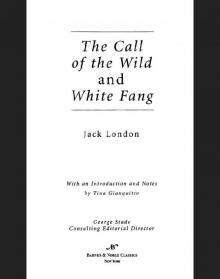 Call of the Wild and White Fang (Barnes & Noble Classics Series)
Call of the Wild and White Fang (Barnes & Noble Classics Series) The Valley of the Moon
The Valley of the Moon The Cruise of the Snark
The Cruise of the Snark The Game
The Game An Autobiography of Jack London
An Autobiography of Jack London